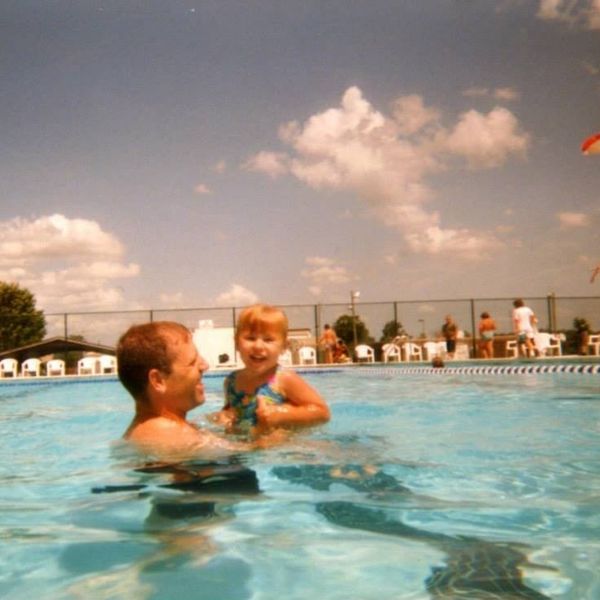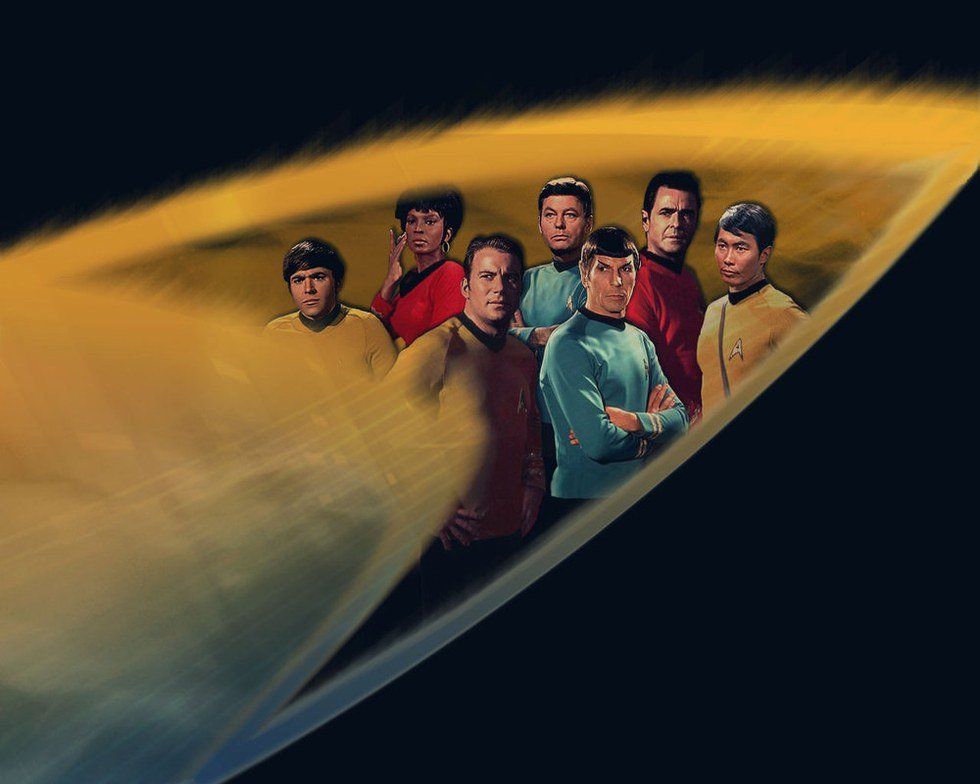My parents did everything they could to foster proper child development and ensure that my brother and I grew up to be well-adjusted, academically inclined members of society. They stressed the importance of homework and studying, taught us to question authority (but not too much), to ask questions, and encouraged but did not force us to allow religion into our lives. I understand as well as any child can that parenting is a wild ride with no right answers, but one place where I am sure my dad never went wrong was when he introduced me to "Star Trek.
My father is an extremely intelligent and well-educated man, so not many people expect him to be an encyclopedia of television trivia. He knows the theme song to virtually every TV show of his childhood, and even many shows that aired before he was born. My dad can tell you that Robin Williams got his start on "Mork and Mindy," but that Pam Dawber was not nearly as successful as her male costar. He knows that "Green Acres" is set in Hooterville, and he will gladly sing the "Mr. Ed" theme song. His den closet is a mess of VHS tapes and DVDs of vintage TV shows, and it was from there that "Star Trek: The Original Series" was unearthed.
I was about twelve years old on this day, and was midway through my sixth grade year. With my self-esteem significantly lowered from a prior year of relentless bullying, I was having difficulty navigating the nuances of middle school. Middle school offered an entirely new set of challenges like changing in the locker room amongst bodies that seemed to be developing in a much more attractive way than mine, and acquiring a particular type of friendship of a male student for the purpose of being seen holding his hand in the cafeteria. This was all before any sort of real teen angst manifested in my life, and my relationship with my parents was still quite genial. So, when my dad came to me with a box of "Star Trek" DVDs one weekend and asked me to sit down and watch an episode with him, I obliged with only an absolutely reasonable amount of griping. We watched several episodes of the original series that day, and the crew’s adventures fascinated me. I watched Captain Kirk interact with his predecessor, the bodiless Captain Pike. Mr. Spock and Dr. McCoy butted heads, but their disagreements were always playful. There was a sense of rightness to the show. The crew was often in a bad situation, but just as I had faith that my dad would not make me watch something boring or tasteless, I knew that Captain Kirk would get his star ship and crew to safety.
As I progressed through my sixth grade year, I felt different from most of my peers. Despite my abysmally low opinion of myself, I could recognize that I was and still am of above average intelligence. While I made straight A’s, breezed through my homework, and embarked on writing projects in my spare time, I had trouble connecting with most of my classmates. I maintained a conservative amount of friendships, but our relationships were largely superficial and centered on mockery of my devotion to choir, writing, and my apparent pudginess.
Yet, when my dad and I were together, and the shrill wail of the "Star Trek" theme song filled the room, none of that mattered. On the bridge of the USS Enterprise it was neither popularity nor good looks that counted; rather, intelligence was at a premium. Captain Kirk did not become the leader of his four hundred and thirty member crew based on his dashing good looks or his ability to make small talk. He became captain because of his strong leadership skills, his cool-headedness under pressure, and his intelligence. I saw bits of myself in Captain Kirk, and dreamed of someday having the confidence to be in a leadership position like him. I admired Lieutenant U’hura, the ship’s polyglot who worked as a translator. I was enrolled in Spanish classes in school with the knowledge that gaining proficiency in another language could make me more marketable when I sought employment. Just as Lieutenant U’hura’s fluency in intergalactic languages brought her the opportunity to “boldly go where no [one] has gone before,” my proficiency in Spanish helped me place orders in restaurants in Little Havana and came in handy when I was working in a touristy part of Daytona Beach as a cashier.
My relationship with my dad was strengthened after he introduced me to "Star Trek." We monopolized many family dinnertime conversations with discussions of Captain Kirk’s command decisions and distinct way of delivering dialogue. We speculated on the engineering and physics that powered a phaser, and what exactly went on inside a transporter. One of my favorite topics of discussion was Mr. Spock, the science officer and second in command, my favorite character in all aspects. I found him strangely attractive, and was vaguely enticed by his pointy ears. His voice was soothing and sensual, and he moved with a self-assured grace. I admired his logic, the way he could quickly and coolly evaluate any situation and quickly determine the best course of action. Much of what I admired about Mr. Spock was reflected in what I appreciated about my father. Dad is slow to anger, endlessly patient, and good at conflict resolution. It is these qualities that made him so successful as a mediator, led to even more success when he became a circuit judge in January of 2015. But more importantly than being a good lawyer, my dad is an excellent father. He was, and still is, someone I can talk to about all areas of my life. He provides the level-headed, logical advice of Mr. Spock with the compassion and empathy of Captain Kirk. One of our favorite conversation starters is what rank and position we would like to hold on the star ship Enterprise. When I told my dad that I wanted to be the chief engineer, rather than pointing out that I could barely comprehend pre-algebra, he said I would be an excellent engineer. "Star Trek" encouraged me to dream as big as the galaxy, and my dad encouraged me to pursue those dreams.
Star Trek stuck with me through all of middle school. It was a time of personal growth, and of dramatic ups and downs. I carried a journal everywhere with me, in which I catalogued my innermost thoughts. Soon, I began my first fan fiction. I wrote about myself as a young Vulcan who turned against traditional Vulcan teachings of logic to join the Federation and experience human emotions. (Even at this tender age, I was a fan of oppositional ideology.) When there was no one at school to eat lunch with, I did not despair, but instead wrote dialogue between myself and the crew of the Enterprise: Captain Kirk praised me for my cleverness on the bridge, and Mr. Spock instructed me in Vulcan teachings and found my deviance from tradition, “fascinating.” I never felt that I had no one. Even when I was alone, Mr. Spock was there to guide me, and when I got home, Dad was there to enhance the next episode with his vast knowledge of "Star Trek" trivia.
As I progressed through middle school, I was afflicted by a severe case of teen angst, which later revealed itself to be a plethora of bona fide mental illnesses. The next few years would be characterized by a struggle to get myself back to emotional and physical wellness, something I am still working on today. I learned about the wise mind, which is the perfect balance between the emotional mind and the rational mind. Alone, the emotional mind will cause erratic behavior, impulsiveness, and a general loss of control. On the other hand, if the rational mind dominates, an individual will become cold and repressed. One of the goals of dialectical behavioral therapy is to unify the emotional and rational minds to form the wise mind. Individuals who are in touch with the wise mind are able to recognize emotions and then evaluate them logically to decide if they are worth acting on. As I embarked on my journey towards recovery, I felt a connection with Mr. Spock. He constantly struggled to repress his emotional human side and let logic dominate. Yet, he could not always do it. Similarly, I did everything I could to numb myself and deny that I experienced emotions. This was not an effective coping skill, and I was prone to emotional outbursts and self-destructive behavior. I sought to unify my own mind—retaining elements of Mr. Spock’s intelligence and rationality, but acquiring Captain Kirk’s robust nature and zest for life.
At its core, "Star Trek" is a show about history. Granted, it is about history that has not yet occurred, but the adventures of Captain Kirk, as well as captains in other series would undoubtedly be in the history books of the fictional children of the show. "Star Trek" is about both knowing one’s roots and boldly going towards the future. My father embodies these values and has done his best to instill them in me. He is fascinated with our family’s origins, and makes me proud to bear the name Orfinger. Because of my dad, I know that my great grandfather left Europe to open a candy store in New York. I know that my father’s father was a musician and respected judge. Because of my dad, I strive for success and I want to be another Orfinger to be proud of.
"Star Trek" will always be more than a show to me. It is a reminder of good times spent with my dad, conventions we attended together, and jokes we still share. When my dad introduced me to "Star Trek", he showed me that my intelligence is what will get me far in life. He showed me that doing the right thing is most important. Most of all, "Star Trek" showed me that where I come from is just as important as where I’m going. I may not be flying a star ship, but I have just embarked on a journey of academic and personal growth as I return to college. As I take risks and explore life with a little more independence, I take comfort in knowing my dad is just a phone call away, and wants me to live long and prosper




















